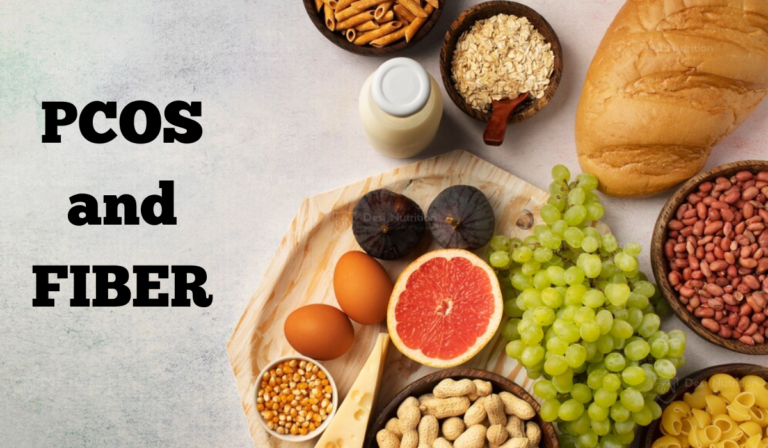We have talked so much about Polycystic Ovary Syndrome (PCOS) which affects millions of women globally, manifesting in symptoms such as hormonal imbalances, irregular periods, insulin resistance, weight gain, and difficulty in managing blood sugar levels. We have talked about nutrition for PCOS and in this article we will talk about the role of fiber for PCOS.

By increasing fiber in your dietary approach you can effectively manage PCOS symptoms including blood sugar levels, weight management and hormonal balance. Fiber found in plant-based foods also supports digestive health.
Let us explore the benefits of fiber for PCOS and how you can incorporate more fiber into your dietary approach.
Why Fiber Is Important for Women with PCOS
- Regulates Blood Sugar Levels
Insulin resistance is a common symptom among women with PCOS. Women with PCOS need to make such lifestyle changes that will help them control their blood sugar levels. Insulin resistance in the body makes it harder to process sugar in the bloodstream. Fibrous foods help to slow down the absorption and prevent spikes in blood sugar levels. It helps to reduce the risk of insulin resistance. Consuming fiber helps with a steady release of sugar that helps to manage energy levels and reduce cravings.
- Supports Weight Management
Women with PCOS find it challenging to manage their weight. Fiber can help you to lose and manage weight. High-fiber foods promote the feeling of satiety, which means you feel fuller for longer times and prevent overeating. Women with PCOS need to manage their weight because excess weight can exacerbate symptoms like irregular periods, excess hair growth and acne.
- Balances Hormones
Women with PCOS face hormonal imbalances but fiber can help you balance hormones as well. Fiber can aid in regulating estrogen levels. High-fiber foods help the body eliminate excess estrogen, reducing the risk of hormonal imbalances that are often associated with PCOS.
- Improves Digestive Health
Many women with PCOS struggle with their digestive health. They may face digestive issues like constipation and bloating. However these issues can be resolved by consuming fiber in your diet. Fiber aids in digestion by adding bulk to the stool and supports regular bowel movements and prevents constipation. Many women with PCOS struggle with digestive issues, such as constipation and bloating.
How Much Fiber Do You Need?
Women with PCOS should ensure their fiber intake throughout the day. You can also consult a healthcare professional. Usually people fail to meet their body’s requirement of fiber, but here is a breakdown of the types of fiber and where you can find them:
- Soluble Fiber
Soluble fiber is found in foods like oats, beans, apples and carrots. It is named soluble fiber because it dissolves in water and forms a gel-like substance in the stomach. It helps to lower down blood sugar levels and cholesterol.
- Insoluble Fiber
Insoluble fiber is named so because it does not dissolve in water. It does add bulk to your stool and helps move the food through your digestive system. Insoluble fiber is found in whole grains, nuts, seeds and vegetables like cauliflower and green beans.
Top High-Fiber Foods for a PCOS Diet

- Legumes and Beans
Lentils, chickpeas, and black beans are not just excellent food sources of protein but also provide fiber to the body. If you are looking for foods that provide fiber to women with PCOS, then legumes and beans are your option. They are considered great sources of fiber for PCOS because they are low on the glycemic index which means they help to control blood sugar levels.
- Whole Grains
Add whole grains such as quinoa, brown rice, and barley in your diet instead of refined grains like white rice and pasta. Whole grains provide more fiber to the body than refined grains. High-fiber food helps to stabilize blood sugar levels.
- Fruits and Vegetables
Add plenty of fruits and vegetables in your diet. Fruits like berries, apples, and pears (with the skin on) and vegetables like broccoli, spinach, and Brussels sprouts are high in fiber and packed with vitamins and antioxidants that support overall health.
- Nuts and Seeds
Chia seeds, flaxseeds, and almonds are excellent sources of both soluble and insoluble fiber. They are also a great source of healthy fats that support hormone balance and reduce inflammation, both of them, are major symptoms of PCOS.
- Psyllium Husk
Not many people have heard of psyllium husk but it is a natural supplement which you can add to smoothies or water to boost fiber intake. You don’t have to alter your flavor by adding psyllium husk because it will have no effect whatsoever on the taste. You add it to your diet just as an alternative to maintain the requirement of fiber in your body.
Tips for Incorporating More Fiber into Your PCOS Diet

Women with PCOS often struggle to add fiber in their diets. Here are some points that can help you add fiber to your diet:
- Start Your Day with Fiber
The best way to begin with fiber is to actually start your day with fiber-rich breakfast. You can have oatmeals topped with chia seeds, flax seeds and berries. They help you to provide a slow release of energy throughout the morning preventing sugar cravings.
- Add Fiber to Your Snacks
We often fail to choose healthy snacks and snack on sugary or processed foods. But women with PCOS should try to incorporate fiber in their diets by choosing fiber-rich snacks like a handful of almonds, a fruit with the skin on or raw vegetables with hummus.
- Include Fiber in Every Meal
Make your day filled with fiber by adding fibrous food in every meal. Add leafy green vegetables in your lunch salad, whole grains to your dinner and a side of lentils to your main dish.
- Gradually Increase Fiber Intake
Sometimes people find it challenging to add fiber in their diets. SO you need to start gradually. If you’re not used to consuming a lot of fiber, increase your intake gradually to avoid bloating and gas or other digestive uneasiness. Drink plenty of water so fiber absorbs water or else you might have to face constipation.
- Experiment with Fiber-Rich Recipes
You can also experiment with fiber-rich foods by trying various recipes. Incorporate fiber-rich ingredients in your recipes and pair them with foods with macro and micro-nutrients. You can make a quinoa salad, a vegetable stir-fry with whole grains, or a lentil soup. You can also add herbs and spices to not just make your dish tasty but also to derive various health benefits.
- Choose Whole Foods Over Processed Foods
Make sure you are choosing whole foods instead of processed foods. Whole foods contain more fiber than processed foods which will help to regulate blood sugar level and improve overall health. Choose whole grains, legumes, fruits and vegetables in their natural forms instead of their processed alternatives.
Meal Plan Example for a Fiber-Rich PCOS Diet
Here’s an example of how to incorporate more fiber into your day:
- Breakfast:
You can have oatmeal with chia seeds, flaxseeds, and fresh berries in your breakfast. This is a high-fiber complete meal that will help you feel fuller for a long time. - Snack:
Have an apple with the skin and a handful of almonds as your mid-morning snack. - Lunch:
You can prepare quinoa salad with leafy greens, chickpeas, cucumbers, and olive oil for lunch. - Snack:
Eat carrot and celery sticks with hummus as your evening snack. - Dinner:
Prepare grilled salmon with roasted Brussels sprouts and brown rice and enjoy your dinner. - Dessert:
You can have a small bowl of mixed berries topped with chia seeds for dessert.
Frequently Asked Questions
Should PCOS avoid wheat?
Ans. Women with PCOS might see effective results if they eliminate gluten from their diet. Try to avoid wheat and choose whole grains like quinoa, white rice, and barley instead.
What is the best fiber for PCOS?
Ans. The best foods for fiber are fruits and vegetables, whole grains, legumes, beans, nuts, and seeds.




